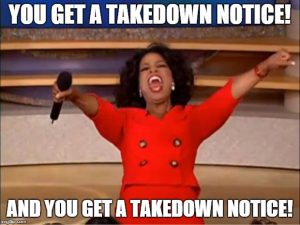Amazon Merchant Takedown Notice Attack Spills Over to Court–GM Photo v. Focus Camera
[Note: lawsuits over takedown notice attacks occur occasionally. I’m blogging this case as an exemplar, not because it’s unique.]
 This case involves two Amazon marketplace merchants, GM Photo (operating as Digital Village) and Focus Camera. At issue are “high-end Sigma brand single-lens reflex camera lenses that retail for approximately $600 to $1,200.” GM claims that in October 2022, Focus “conspired to de-list certain of GM’s Amazon listings” by claiming that GM was peddling counterfeits items. GM also alleges that “[e]ach time Focus reported one of GM’s Sigma lens listings as counterfeit, Amazon suspended the reported listing, preventing GM from selling the reported lens.” Elsewhere, the opinion suggested that Focus’ takedowns disrupted $1.5M of GM’s inventory.
This case involves two Amazon marketplace merchants, GM Photo (operating as Digital Village) and Focus Camera. At issue are “high-end Sigma brand single-lens reflex camera lenses that retail for approximately $600 to $1,200.” GM claims that in October 2022, Focus “conspired to de-list certain of GM’s Amazon listings” by claiming that GM was peddling counterfeits items. GM also alleges that “[e]ach time Focus reported one of GM’s Sigma lens listings as counterfeit, Amazon suspended the reported listing, preventing GM from selling the reported lens.” Elsewhere, the opinion suggested that Focus’ takedowns disrupted $1.5M of GM’s inventory.
The opinion doesn’t lay this out clearly, but it appears GM was selling legitimate grey market goods without manufacturer warranties, rather than “counterfeits.” GM asserts that Focus knew this fact but nevertheless mischaracterized GM’s behavior as “counterfeiting.”
GM sued Focus for its takedown notice attacks at Amazon. The district court dismisses some of GM’s claims but allows others to proceed.
Defamation
The court says that GM may proceed with a per se defamation claim based on the takedown notices’ alleged injury to its business reputation. An allegation that “a defendant filed false Amazon counterfeit reports” is sufficient to state a claim. This is true even if the defendants made its associated fact claims to Amazon “under penalty of perjury.” Thus, “Plaintiff’s allegations provide a reasonable basis to infer that Defendants knew that GM’s listings were not counterfeit, but that Defendants reported GM’s listings anyway, perhaps because they knew that doing so would likely result in the removal of GM’s products from Amazon during the lucrative holiday shopping season.”
In response, Focus claimed “that the law in this Circuit is that a “grey market” good is a “counterfeit” good, and that since GM’s Sigma lenses were grey market goods, it was substantially true to report them as counterfeit.” Um, no. Collapsing the distinction between “grey market” goods and “counterfeits” is 100% wrong. (For more on the nomenclature problem, see Prof. Fackrell’s article). In any case, the court says Focus’ argument misses the point; GM adequately alleged that Focus subjectively knew its takedown notices were false.
Tortious Interference
The court greenlights the tortious interference with business relations claim. I note that this is a trademark case, not a copyright case. If it had been copyright, then 512(f) probably would have preempted the tortious interference claim.
Implications
The court repeatedly invoked the pleading burdens to accept GM’s allegations as true. This case could look quite different on summary judgment when the court can fully consider Focus’ evidence.
This is a battle between Amazon merchants. Because Focus is a merchant and not the manufacturer/trademark owner, it doesn’t have standing to enforce any trademark claims against GM. That’s why Focus had to use Amazon’s takedown mechanism rather than judicial enforcement. Even so, Amazon takedowns can inflict a lot of damage on the targeted merchant and the marketplace generally. This is especially true during the holiday season, when taking a key competitor out of the marketplace can boost the remaining merchants’ prices and profits and increase their market share.
The facts of this case highlight another way that ex parte TROs, like those used in the SAD Scheme, can go wrong. Focus claimed that GM was “counterfeiting,” and a judge hearing an ex parte TRO wouldn’t have had any reason to doubt that–until it heard GM’s grey market goods explanation, in which case Focus’ story would fall apart. That didn’t happen in this case, but it’s easy to see how similar facts could lead to litigation abuse. #StopTheSADScheme
Case Citation: GM Photo, LLC v. Focus Camera, Inc., 2025 WL 1226629 (S.D.N.Y. April 24, 2025)
UPDATE: Ningbo Yituo Enterprise Management Co., Ltd., et al. v. GoPlus Corp., 2025 WL 1421394 (C.D. Cal. April 10, 2025):
the Court finds that: (1) Defendant’s use of a DMCA takedown notice is protected conduct under § 425.16; and (2) Plaintiffs’ tortious interference claim is preempted by 17 U.S.C. § 512(f). As such, Defendant’s Anti-SLAPP Motion is granted
